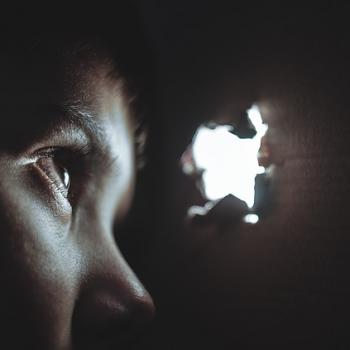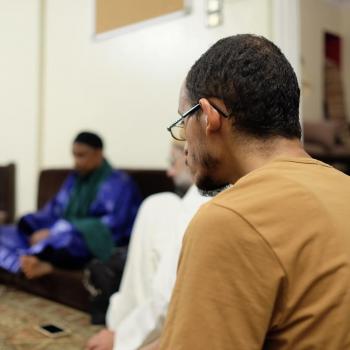By Rushain Abbasi
I passed by the shadowy garbage cans and the mysterious sounds of a muffled ruckus greeted my ears, probably the mewing of ravenous cats searching for an early breakfast, wrestling each other for the last piece of wasted kinafah. As a rationalist Muslim I didn’t care much for ritual, so I rarely attended my religion’s morning meal in its sacred dining hall. That day, however, I decided to give the mosque a try for the dawn prayer.
The adhan, a uniform radio jam loud enough to awaken even the Ahl al-Kahf flooded through the narrow and hilly alleyways of ‘Amman. Each mosque inconveniently began the call a full second after the other, leaving the sleepers prey to a cacophony of deafening wails.
Looking up from its base, the towering minaret was surprisingly humbling against the dim auroral glow of the morning sky. I entered the mosque racing up the stairs; a childhood habit yet unabandoned. I was met at the top of the steps with a scolding face from an ‘ammu disapproving of my immature entrance. I wanted to look back at him with a stupid face, but instead I blindly apologized without explaining myself; another habit grinded into me as a child.
The inside of the mosque sidetracked me from my pious purpose with its grand church-like windows and golden tapestries. Below, the ornamented emerald carpet revealed itself like the everlasting gardens from one of Homer’s epics, as if it were an ancient rug of never-ending freshness and immortality. I wanted to sink in this oasis of peace.
My mind quickly returned as I sat down next to the mu’adhhin, the man who calls the people to worship. His snowy beard, shining like the moon’s ethereal reflection, projected a deep wisdom. His quaint smile calmed the surrounding air, leaving those around him in a paradisiacal state. He was a small, stock man, probably unnoticed most of his life, but he had a purpose, which he knew and lived for. He began to call to the prayer in a sweet motherly melody, like an empyrean lullaby, and we slowly, gently fell asleep…
Allahu Akbar. And we entered another realm, alive as ever. It was an odd yet intimate sight; bearded Arab men wearing robe upon robe standing with their shoulders flush against one another, a clean shaven desi boy in sweats and a kurta sandwiched in between.
The Imam’s voice rang through the walls shaking the chandeliers. I stood still maintaining an unusual state of concentration, I suppose because of my newly developed language skills.
The Holy Book felt real and authentic for the first time. It was no longer a childhood tale told in an incomprehensible foreign tongue. The words glided through the air, “So when I have made him (mankind), and have breathed into him of My spirit…”, and I didn’t want to exhale. The thought of being a vessel for His essence gave me a sense of comfort akin to the feeling of having my head in my mothers’ lap, her hand grazing the roots of my hair.
What ensued immediately after the prayer left me in a state of wonder. The modest mu’adhhin commenced a medley of remembrances of God in a piercing voice that sounded strangely familiar.
I closed my eyes and danced in my place, the embodiment of a madrasa child rocking back and forth to the rhythm of the Quran. I felt like myself, in a mosque of all places! I didn’t want him to stop. Sitting there, I wanted to toss my beads into the air and run along the walls, smash in the windows, tackle the Imam into the ground, then playfully laugh with the congregation.
My rationalism faded into an abyss and reemerged as a senseless spiritualism.
Just when I thought we were done, ten men in long flowing robes of exceeding whiteness stood together in a circle, their faces glowing. With their eyes wide shut, they pointed their index fingers to the sky and solemnly recited the name of God. Allah. Allah. Allah. And I peaked.
After the celestial concert concluded, I walked through the exit nearing the shoe racks. The place reeked of vile odor. Stepping outside, I saw a beggar resting by the gate of the mosque while most, save a few, worshippers strolled by with blind eyes. In the courtyard, plastic bags danced around the roots of malnourished trees.
I felt dirty again. Man’s weakness was on full display.
It was too genuine.
My Fajr was an overwhelming experience of immersion in heavenly bliss, yet stained by a disparaging face and penetrating immoral apathy. The mosque became real for me. It was no longer a holy house that flashed boisterously harboring a hollow soul.
It was a place of honesty, with real people, real attempts at transcendence, and real failures. The calligraphy was stained with our human filth, our worldliness. The minbar sat high upon the mountain of our sins.
I was reminded of the term ‘adhaab used in the Quran to describe the punishment that is in store for those who are ungrateful to God. The root ‘a-dh-b, in its origin, means to be sweet, pleasant, agreeable. I was always confused by the derivation of this term that at the same time denoted both a severe punishment and a honey-like sweetness. But now I understand the contradiction.
It is the universal contradiction of our own existence: finite beings from an infinite source. The contradiction of Islam: a straight path in a crooked world. The contradiction of our mosques: sacred spaces full of chaotic, sometimes profane beings.
Yet these perplexing paradoxes give life all the more meaning. In reality, they’re simply a reflection of ourselves. The ultimate contradiction: base beings capable of considerable evil, yet simultaneously, custodians of an infinite potential to be beautiful and virtuous.
Sadly, it is our nature to be tortured by the vagaries and ambiguities of life.
So how do we cope?
Discussing the Islamic notions of Heaven and Hell Mostafa Badawi writes, “There the mixture of good and evil, beauty and ugliness, perfection and imperfection, and happiness and misery that characterized the previous stages is finally disentangled.”
Perhaps, this life is just a cluster of irritating knots waiting to be undone.
So I lower my head, and with a soft smile gaze upon the flaws sewn into the fabric of life, and I can’t help but collapse in awe at the beauty and mystery hidden within each seam.
Rushain Abbasi is an American Muslim of Pakistani descent. He is pursuing his Master’s in Islamic Studies at Harvard University.











